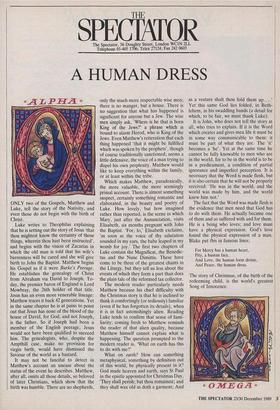THE
SPECTATOR
The Spectator, 56 Doughty Street, London WC1N 2LL Telephone 01-405 1706; Telex 27124; Fax 242 0603
A HUMAN DRESS
ONLY two of the Gospels, Matthew and Luke, tell the story of the Nativity, and even those do not begin with the birth of Christ.
Luke writes to Theophilus explaining that he is setting out the story of Jesus `that thou mightest know the certainty of those things, wherein thou hast been instructed', and begins with the vision of Zacarias in which the old man is told that his wife's barrenness will be cured and she will give birth to John the Baptist. Matthew begins his Gospel as if it were Burke's Peerage. He establishes the genealogy of Christ from Abraham via David to Joseph. To- day, the premier baron of England is Lord Mowbray, the 26th holder of that title. Jesus has an even more venerable lineage: Matthew traces it back 42 generations. Yet in the same chapter he is at pains to point out that Jesus has none of the blood of the house of David, for God, and not Joseph, is the father. So if Joseph had been a member of the English peerage, Jesus would not have been qualified to succeed him, The genealogists, who, despite the Ampthill case, make no provision for virgin birth, would have dismissed the Saviour of the world as a bastard.
It may not be fanciful to detect in Matthew's account an unease about the status of the event he describes. Matthew, after all, omits all those details, so beloved of later Christians, which show that the birth was humble. There are no shepherds, only the much more respectable wise men; there is no manger, but a house. There is no suggestion that what has happened is significant for anyone but a Jew. The wise men simply ask, 'Where is he that is born King of the Jews?' a phrase which is bound to alarm Herod, who is King of the Jews. Even Matthew's reiteration that each thing happened 'that it might be fulfilled which was spoken by the prophets', though of course traditionally sanctioned, seems a little defensive, the voice of a man trying to dispel his own perplexity. Matthew would like to keep everything within the family, or at least within the tribe.
Which makes Matthew, paradoxically, the more valuable, the more seemingly primal account. There is almost something suspect, certainly something romantic and elaborated, in the beauty and poetry of Luke. How lovely, but how imagined rather than reported, is the scene in which Mary, just after the Annunciation, visits Elisabeth, six months pregnant with John the Baptist. 'For, lo,' Elisabeth exclaims, `as soon as the voice of thy salutation sounded in my ears, the babe leaped in my womb for joy.' The first two chapters of Luke contain the Magnificat, the Benedic- tus and the Nunc Dimittis. These have come to be three of the greatest chants in the Liturgy, but they tell us less about the events of which they form a part than does the plain tale of the reformed tax collector.
The modern reader particularly needs Matthew because his chief difficulty with the Christmas story is that he is inclined to think it comfortingly (or tediously) familiar (even if he has forgotten its details), when it is in fact astonishingly alien. Reading Luke tends to confirm that sense of fami- liarity; coming fresh to Matthew reminds the reader of that alien quality, because Matthew himself cannot explain what is happening. The question prompted to the modern reader is, 'What on earth has this to do with me?'
What on earth? How can something metaphysical, something by definition out of this world, be physically present in it? God made heaven and earth, says St Paul in the epistle appointed for Christmas Day, `They shall perish; but thou remainest; and they shall wax old as doth a garment; And
as a vesture shalt thou fold them up....' Yet this same God lies folded, in Beth- lehem, in his swaddling bands (a detail for which, to be fair, we must thank Luke).
It is John, who does not tell the story at all, who tries to explain. If it is the Word which creates and gives men life it must be in some way communicable to them: it must be part of what they are. The 'it' becomes a 'he'. Yet at the same time he cannot be fully knowable to men who are in the world, for to be in the world is to be in a predicament, a condition of partial ignorance and imperfect perception. It is necessary that the Word is made flesh, but it is also certain that he will not be properly received: 'He was in the world, and the world was made by him, and the world knew him not.'
The fact that the Word was made flesh is the evidence that men need that God has to do with them. He actually became one of them and so suffered with and for them. He is a being who loves; and love must have a physical expression. God's love found the physical expression of a man. Blake put this in famous lines:
For Mercy has a human heart, Pity, a human face, And Love, the human form divine, And Peace, the human dress.
The story of Christmas, of the birth of the redeeming child, is the world's greatest Song of Innocence.
oOMEGA-










































































































 Previous page
Previous page